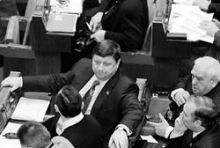Leonid Kuchma declared last Wednesday that both the president and premier are interested in preserving the parliamentary majority. He is quoted by UNIAN as saying that “this majority has suffered a slight setback” because there is no normal dialogue with the government. Yet he is convinced that without a majority Ukraine will reach a dead-end.
Meanwhile, the majority confronted new problems when it came to setting up the Regions of Ukraine group in Verkhovna Rada. Politicians faced a dilemma: What was it? Double, maybe triple play, or the party leader and Chairman of the Tax Administration Mykola Azarov was so sure of his forces he was waging an independent policy?
Leonid Kuchma partially answered the questions on March 21. News agencies report that he lashed out at the new group while in Bakhchysarai, saying, “This is more evidence that the election campaign is underway, and I regret to say that it will not make Verkhovna Rada work more effectively.”
Regional Renaissance leader Oleksandr Volkov was even more blunt. Interfax Ukraine quotes him as saying that the new group could trigger off the majority’s collapse, and that the leader of the new party, head of the State Tax Administration (STA) Mykola Azarov behaved improperly in this regard, as he declared on March 16 that only deputies and members of the Party of the Regions of Ukraine would be members of the new group [five of the group’s sixteen members — Ed.]. Mr. Volkov also believes that if they really wanted to reinforce the majority, they would attract unaffiliated members. As it was, they lured Solons from other factions to join them, using influence and pressure, people that have nothing to do with the party at all. The reason is simple, he says. It is just that the new group is taken care of by the head of the STA and everybody in business want to have that kind of protection.
Oleksandr Volkov maintains that from now on other centrist deputies will want to leave their factions and groups, so one can only hope that they will join the pro-presidential fractions. “But what if they side with other factions?” he asks.
Mr. Volkov regards the Regional Renaissance and Labor Ukraine as victims of this brain drain taking place behind the back of the group leader and reserves the right to “act accordingly.”
“It is the deputies’ own business whether to quit, join, or set up [groups]. If some people’s deputies decided to form Regions of Ukraine, who can deny them the right?” Mykola Azarov told The Day. “I think it’s a perfectly objective process of structuring political forces, which is underway on the eve of the parliamentary elections.” He also pointed out that “the next stage will be the emergence of a united faction [i.e., Regions of Ukraine and Solidarity — Ed.] having an altogether different configuration and numerical strength.”
Now it is clear that the part of the majority or quasimajority originally considered unequivocally pro-presidential has become anything but unequivocal a year before the elections.
An outsider might find it difficult to figure out the ideological difference between RR and RU, as both groups declare their support for regional interests (although the new group is obviously dominated by people from Donetsk oblast), are largely made up of businesspeople, and proclaim a centrist policy. In addition, they mostly consist of deputies elected on a majority basis and are not prohibited from so doing. Also, it is hard to understand what is allowed under the parliament’s rules and what is prohibited. New rules are still being considered.
Some sources claim that Mykola Azarov will visit Leonid Kuchma immediately after the presentation of the new group, bearing in mind that the chief executive is said to have been, to put it mildly, surprised to learn about the Regions of Ukraine.
In general, the new alignment of forces in parliament, in terms of factions and groups, leaves one wondering, as the Communists and Socialists are probably the only ones in a position to state with confidence that they formed their factions and groups proceeding from the election results. Everything else was put together by squatting; the legitimacy of the votes cast for Batkivshchyna, Kostenko’s Rukh, Yabluko, Solidarity, and now Regions of Ukraine raises certain doubts, but such is the Ukrainian political reality. Some experts believe that the proportional representation election bill and the currently effective law on political parties could be a remedy of sorts for this legislative Brownian movement and perhaps a warning to all those keen on breaching the convention, but other problems could also ensue.
Mr. Volkov’s irritation is understandable; it is one thing to have competition — the moving force of the political process at all times — operating by the rules, coordinated by all the interested parties, and an altogether different thing when the arrangements made between the newly formed majority and newly appointed cabinet turn out to not work.
The reality is such that the president, premier, and all the participants in the parliamentary majority, save for Batkivshchyna, have up to now insisted on the need to preserve and strengthen the majority. Yet, with each passing day, an increasing number of observers are inclined to proclaim its apparent death.







